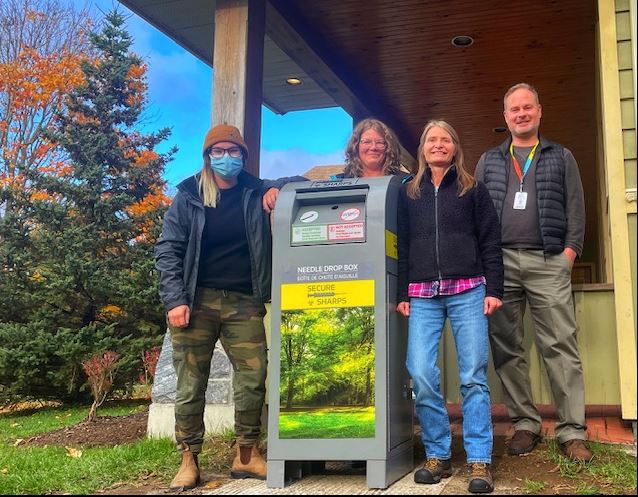New locations have been chosen for 24-hour needle disposal bins throughout the jurisdiction of the Haliburton Kawartha Pine Ridge District Health Unit.

The bins aim to reduce the number of discarded needles found in parks and public spaces, the health unit says. The project is a partnership with the Peterborough Aids Resource Network (PARN), the John Howard Society, Greenwood Coalition, the Town of Cobourg, the Municipality of Dysart et al, the City of Kawartha Lakes, Community Living Campbellford/Brighton and the Haliburton County Library System.
Locations chosen include:
City of Kawartha Lakes:
- Lindsay: The health unit’s office at 108 Angeline St. S. (front entrance)
- A second location to be announced.
Northumberland County:
- Cobourg: Rotary Harbourfront Park washrooms/bus shelter building at 35 Albert St. (south side facing the parking lot)
- Campbellford: Community Living Campbellford Brighton at 65 Bridge St. E. (back door of the building facing the parking lot)
- Port Hope: The health unit’s office at 200 Rose Glen Rd. N. (by the back entrance)

Get weekly health news
Haliburton County:
- Haliburton: Head Lake Park 78 Maple Ave. (behind the Dysart Library branch)
- Haliburton: Municipal parking lot by the Drag River Trail, 80 Maple Ave. (across from the library in Haliburton Village)
“When needle disposal bins are located in convenient and accessible locations, there will be fewer needles found in parks and public spaces, making it safer for everyone,” said Katlin Archibald, PARN’s harm reduction outreach worker.
“This, in turn, reduces the risk of transmission of infections to community members through contact with needles.”
The bins are part of the health unit’s Needle Exchange Program, which officials say helps prevent the spread of bloodborne infections such as HIV and hepatitis C.
“We implemented a Needle Exchange Program in 2008 and since then have worked with community partners such as PARN and John Howard Society to ensure safe access to a variety of harm reduction programs within the communities we serve,” said Leslie McLaughlin, the health unit’s “healthy communities” public health nurse.
The health unit says stigma often impacts care, treatment and recovery from substance use disorder. People living with substance use say the stigma they face is often worse than the illness itself.
“Public librarians across Canada often seek guidance and training to reduce stigma and the potential for harm in our community spaces, and Haliburton County Public Library is no exception,” said Chris Stephenson, library CAO. “Our staff recently participated in anti-stigma training around drug use provided by John Howard Society as well as optional training on administering naloxone, a medication that is used to reverse the effects of an opioid overdose.”
The health unit reminds the public that if you find a needle, take the following actions:
- Never put a container with needles into the garbage or recycling bin.
- Look up where you can dispose of needles in your community: Find Supplies – Ontario Harm Reduction Distribution Program (ohrdp.ca)
- Call mobile outreach at PARN for information about safe needle clean up or to arrange needle pick-up and disposal – personal bio bins are also available 705-559-3904.





Comments